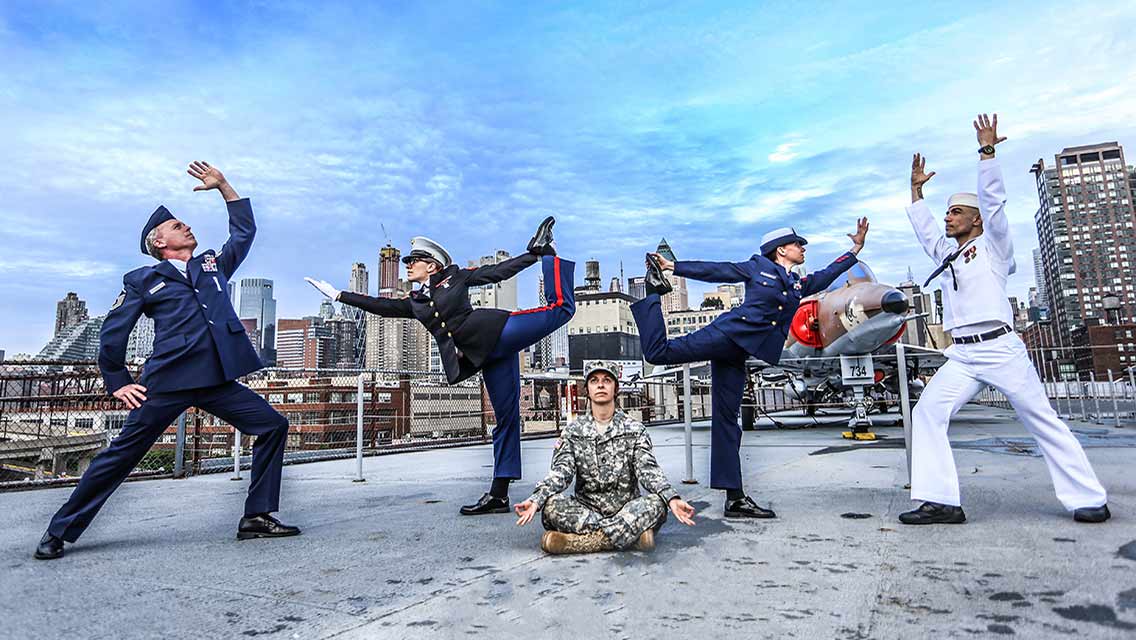Hansen Miller witnessed unforgettable things during his years serving as a captain in the U.S. military. After his honorable discharge from active duty in 2012, he discovered that the hardest part about sharing his stories was not so much the stories themselves but the reactions of the people he told them to.
“They’d either assume what I experienced was like whatever they’d seen in the movies, or they’d reflexively say ‘Thanks for your service’ and look away,” Miller recalls. “It was so alienating.”
Discussions around the difficulties veterans face when readjusting to civilian life tend to center on posttraumatic stress disorder (PTSD), yet those who return from the trenches may contend with more ineffable challenges.
Psychiatrist Jonathan Shay, MD, PhD, and colleagues coined the term “moral injury” to describe the shame, guilt, and existential despair they observed among veteran patients. Shay contended that being forced to witness or participate in violations of moral decency upended the vets’ sense of right and wrong, eroded trust in their leaders, and left them feeling profoundly disconnected from the society to which they eventually returned.
“Betrayal of ‘what’s right’ is particularly destructive to a sense of continuity of value in ideals, ambitions, things, and activities,” Shay wrote in his 1994 book Achilles in Vietnam: Combat Trauma and the Undoing of Character. “When some major ideals have been betrayed, the trustworthiness of every ideal or activity may be called into question.”
Researchers have since investigated the concept of moral injury more formally. We now know that it is extremely common within the military: A study published in 2018 found that more than 90 percent of veterans suffer from at least one symptom of moral injury, including guilt, shame, or questioning of faith. And researchers have discerned that moral injury is both related to and yet distinct from PTSD.
In addition, moral injury is not confined to the military; it can occur in everyday life.
Existential Questions
Characterized by a range of symptoms that include intrusive images, hypervigilance, mood shifts, and a tendency to avoid reminders of the trauma, PTSD is complex yet categorizable: We know enough about how it manifests to recognize when it’s happening.
Moral injury shares some features of PTSD, such as emotional numbing and depression. Yet it occurs on a more existential level. This, coupled with the fact that it has not been nearly as well-studied as PTSD, makes it harder to nail down.
Moral injury can ensue in the wake of a transgression, such as instigating, witnessing, or participating in violence. Yet it’s not always about a choice one made but the fact that one could not make a choice at all.
“I had no illusions about what I was getting into,” he recalls. “People got killed; that was the job.” He became troubled when he tried to make sense of it afterward.
This was Miller’s experience. In many ways he was less affected by what happened while on duty: “I had no illusions about what I was getting into,” he recalls. “People got killed; that was the job.” He became troubled when he tried to make sense of it afterward.
What had been the point of his service? Did he actually contribute to any meaningful cause? And was the system he’d been fighting to preserve really worth preserving?
“I began to understand that the world is uglier than we want to admit,” he reflects.
Amid these existential questions and fading illusions, Miller began to consider whether moral injury may be more prevalent than it seems.
Moral Injury in Everyday Life
Most books and studies on moral injury describe its impact on active military members and veterans, but these are not the only people who contend with situations that violate their conscience or challenge their ideals.
Consider the teacher forced to fail a student who was overwhelmed by a chaotic home life. Or the social worker required to call child protective services knowing it may lead to family separation. The doctors constrained by insurance loopholes or hospital-bed shortages. The police or paramedics responding to the fourth call in a month from the same address.
For those on the frontlines of our social safety net, every day can bring reminders of its failures. One researcher interviewing K–12 teachers described the participants as navigating “a daily struggle between a desire to feel like you are part of a system that produces good in the world and piercing evidence to the contrary.”
One researcher interviewing K–12 teachers described the participants as navigating “a daily struggle between a desire to feel like you are part of a system that produces good in the world and piercing evidence to the contrary.”
Miller agrees. “When you’re exposed to these kinds of things, it puts cracks in your beliefs about society’s foundations.”
Frontline workers may also struggle with feelings of alienation, aware that they see the world in a way that others don’t. “So many people are never exposed to the horrible, necessary things that go into establishing and maintaining our society,” says Miller.
Upon his return to civilian life, he sometimes found it difficult to be around people who never served, describing the “military divide” as “an unexpected form of being othered.”
Healing From Something Without a Name
Less than five decades have passed since PTSD became an officially recognized diagnosis, yet we’ve made great progress in our understanding of trauma and its impact on mental health and how to effectively treat it.
This is not the case for moral injury. “I’m not sure we’ve even figured out how to talk about it yet,” says Miller.
Accordingly, the first step in recovering from moral injury may be simply recognizing that it exists. As a therapist who works with many individuals in helping professions, I make a point to name and normalize the despair my clients confront.
Often, they feel cynical. “I thought going into medicine meant doing what’s best for patients,” noted one of my doctor clients, “not what’s best for the bottom line.”
Then they often feel guilty for feeling cynical. I normalize that, too, because I know that many people who work in helping professions believe they’re supposed to be optimistic and selfless no matter what. This can lead to a sense of “something must be wrong with me” that only compounds the moral injury.
Understanding and accepting that they’re limited by forces beyond their control can alleviate the shame morally injured individuals carry. So does realizing they’re not alone.
“The essential injuries in combat PTSD are moral and social, and so the central treatment must be moral and social,” Shay wrote when reflecting on the things that helped Vietnam vets heal. “The best treatment restores control to the survivor and actively encourages communalization of the trauma. Healing is done by survivors, not to survivors.”
“Connecting with people who have shared experiences is one of the most important things you can do.”
Miller agrees: “Connecting with people who have shared experiences is one of the most important things you can do.”
Self-expression is another. Writing allowed Miller to process his experiences, reconnect with a lifelong passion, and pose — if not necessarily answer — those existential questions. (Discover six types of journaling practices that can help your mental health at, “How to Use Journaling for Mental Health.”)
He even found a way to weave together self-expression and community. In 2014, Miller cofounded the Moral Injury Project at Syracuse University, a collaboration of students, faculty, researchers, and fellow veterans working to raise awareness and promote healing. Among other endeavors, the organization has partnered with the Syracuse Veterans Writing Group and has hosted several veteran art exhibitions.
While he’s no longer as active in the project, Miller considers it a crucial part of his path to healing — though he’s not sure the word “healing” accurately captures his experience. “I’m not sure you entirely heal from moral injury,” he says. “But you can get to a place where you come to terms with what you now know.”





This Post Has 0 Comments